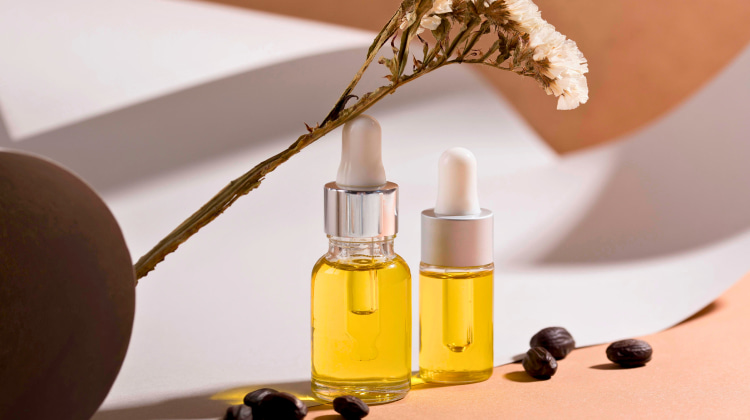
Welcome to the world of luscious locks, where jojoba oil reigns supreme! As someone who's tried their fair share of hair care products, let me tell you: jojoba oil for hair has been a game-changer. If you’re also searching for a natural solution to rejuvenate your lifeless, dry hair, jojoba oil might just be what you’re looking for!
In this article, we'll dive deep into the wonders of jojoba oil, explore its benefits, and reveal the best products to boost your hair game.
What Is Jojoba Oil?
It's a liquid extracted from the seeds of the Simmondsia Chinensis plant(1) and has become a popular ingredient in haircare, skincare, and beauty products. This versatile oil-like wax is native to the desert regions of North America, including Mexico, Arizona, and Southern California. Rich in vitamins B, C, and E, and minerals like copper and zinc, jojoba oil contributes to maintaining healthy hair.
The extraction process for jojoba oil involves cold pressing, which preserves its nutritional value. The oil consists of almost 98% pure waxes, hydrocarbons, sterols, and vitamins with few triglyceride esters. When applied to the skin, the waxy substance in jojoba oil causes the outer cells to swell, creating a moisture barrier similar to sebum. This stability makes jojoba oil an ideal component in various cosmetic and hair care products, as it doesn't break down in the jar or on the skin.
Vitamins & Minerals in Jojoba Oil
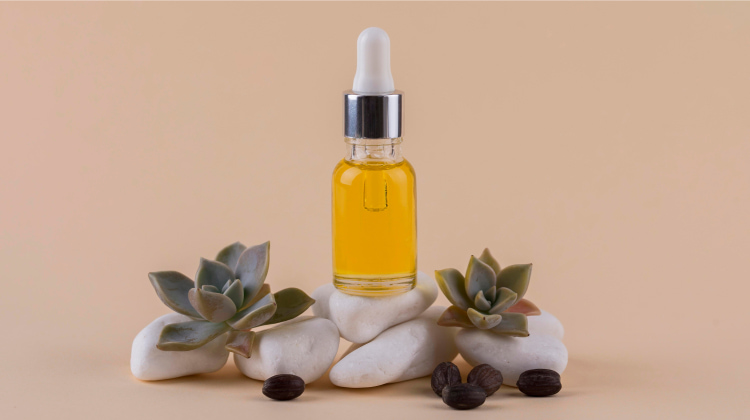
Now that you know what jojoba oil is, let's dive into the vitamins and minerals in jojoba oil(1) that make it such a powerful ingredient for hair care. These nutrients are essential for promoting healthy hair and maintaining its overall well-being.
Vitamin B
Jojoba oil contains B vitamins, which help strengthen hair and reduce breakage. They also aid in maintaining a healthy scalp by keeping it moisturized and nourished.
Vitamin C
This antioxidant vitamin in jojoba oil helps protect your hair from environmental damage, such as pollution and UV radiation. It also contributes to maintaining a healthy scalp by supporting collagen production, which is vital for hair follicle health.
Vitamin E
A potent antioxidant, vitamin E in jojoba oil promotes hair growth by reducing oxidative stress on the scalp. It also helps maintain hair's natural shine and moisture, preventing dryness and breakage.
Copper
This essential mineral found in jojoba oil contributes to hair growth and strength. Copper helps produce melanin, the pigment responsible for hair color, and supports the formation of collagen and elastin, which are essential for hair structure and elasticity.
Zinc
Jojoba oil is rich in zinc, a mineral that plays a crucial role in hair growth and repair. Zinc helps maintain the oil glands surrounding hair follicles, ensuring a healthy environment for hair growth.
What Does Jojoba Oil Do for Your Hair?
Jojoba oil does wonders for your hair, thanks to its numerous benefits. It moisturizes your hair and scalp, making it more manageable and reducing frizz and flyaways. It also promotes hair thickness and growth by dissolving dirt and buildup on the scalp, nourishing hair follicles, and unblocking sebum deposits.
Additionally, jojoba oil repairs damage caused by heat and styling tools, maintains scalp balance, and enhances hair care products.
7 Stunning Benefits of Jojoba Oil for Hair
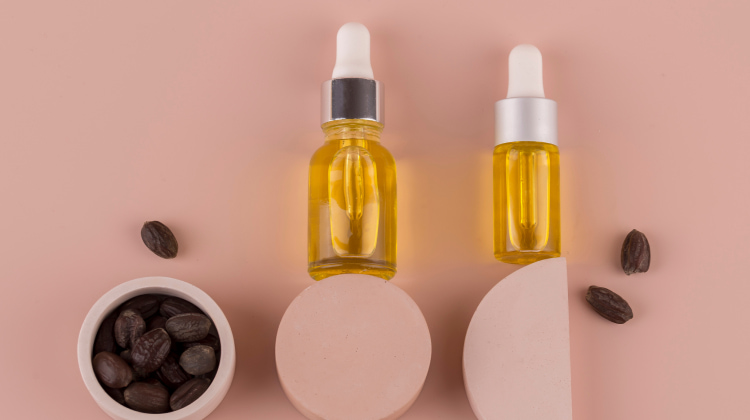
Moisturize Hair and Scalp
Jojoba oil is a fantastic moisturizer for both hair and scalp(2) due to its rich content of vitamins B, C, and E, and minerals like copper and zinc. By penetrating the hair shaft, it provides deep hydration, effectively combating dryness and brittleness.
This makes your hair softer and more flexible, reducing the chances of breakage. It also soothes and moisturizes the scalp, helping to alleviate itchiness and irritation caused by dryness.
Seal In Moisture
Jojoba oil's light, impermeable nature allows it to form a protective layer around each hair strand, sealing in moisture and preventing water loss. This is particularly helpful for curly hair types that tend to struggle with retaining their natural sebum.
The moisture-sealing properties of jojoba oil make it an excellent choice for those living in humid environments, as it helps lock in hydration and keep hair looking smooth and healthy.
Reduce Frizz and Flyaways
By effectively sealing in moisture, jojoba oil helps to tame frizz and flyaways, making your hair more manageable and easier to style. It also adds a subtle sheen to your hair, giving it a polished, well-groomed appearance. This benefit is especially appreciated by people with curly or wavy hair, as it helps to keep their curls defined and bouncy without weighing them down.
Promote Hair Thickness and Growth
Is jojoba oil good for hair growth? Yes, jojoba oil is good for hair growth(3) and thickness by gently dissolving dirt and buildup on the scalp, nourishing hair follicles, and unblocking sebum deposits. This creates an ideal environment for healthy hair growth.
Regular use of jojoba oil can encourage the growth of stronger, thicker hair strands, making your hair appear fuller and more voluminous over time. This also makes jojoba oil a great option for hair regrowth.
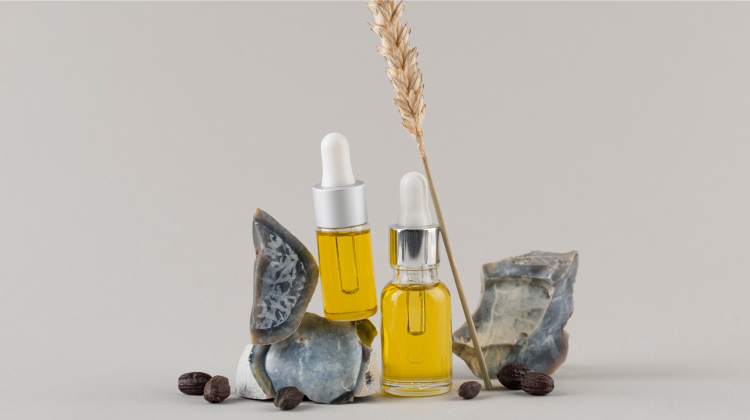
Repair Damage from Heat and Styling Tools
Exposure to heat and styling tools can cause significant damage to your hair, leading to split ends and breakage. Jojoba oil helps repair this damage by sitting on the outer cuticle of each strand, filling in the cracks, and protecting the hair shaft from further harm.
By incorporating jojoba oil into your hair care routine, you can minimize the adverse effects of heat and styling tools, ensuring that your hair remains strong and resilient.
Maintain Scalp's Natural Balance
Jojoba oil's antioxidant and antimicrobial properties(4) help regulate sebum production, maintaining the scalp's natural balance without making hair greasy. This aids in controlling dandruff and restoring the scalp's natural pH balance(5), making it a potential natural dandruff solution. A balanced scalp creates a healthy foundation for hair growth, allowing you to achieve beautiful, healthy locks.
Prevent Premature Greying
Jojoba oil has been known to help prevent premature greying, thanks to its nourishing properties and the vitamins and minerals it contains. By keeping your hair well-nourished and moisturized, jojoba oil can help maintain your hair's natural color and prevent the onset of premature greying. This means that you can enjoy your natural hair color for longer, avoiding the need for frequent coloring or touch-ups.
Hair Type Considerations
Jojoba oil is a versatile hair care ingredient that can benefit various hair types, whether you have straight, curly, or textured hair like 4c hair or black hair. Here's how jojoba oil caters to different hair types:
Straight Hair
Jojoba oil acts as a natural heat protectant for straight hair, forming a protective coating around the strands, making them more resistant to heat damage from straighteners and hairdryers.
Curly and Textured Hair
For those with curly locks, jojoba oil can be an excellent sealing oil after conditioning, helping to seal in moisture and balance sebum production to reduce frizziness. The benefits of jojoba oil for 4c hair or black hair are especially valuable, as these hair types often struggle with retaining moisture and are more prone to breakage.
Thick Hair
Individuals with thick hair can benefit from jojoba oil's strengthening and hydrating properties, ensuring that your luscious locks remain healthy and strong.
Thin or Fine Hair
Those with thin or fine hair can enjoy jojoba oil's light texture. You may consider combining it with heavier oil, like coconut oil, for added deep moisture without weighing your hair down.
How to Use Jojoba Oil for Hair Growth
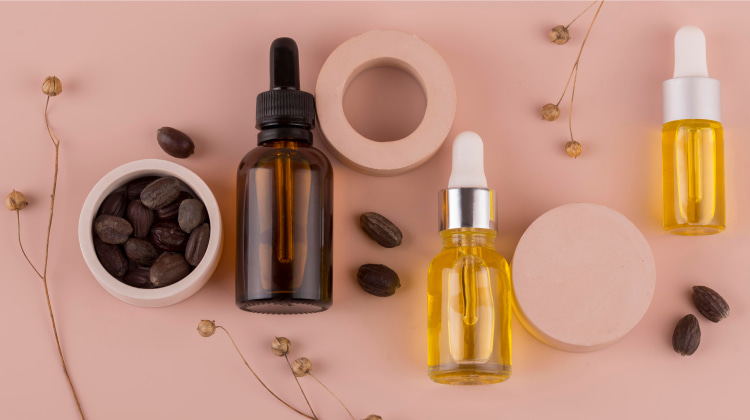
Curious about how to use jojoba oil for hair growth? I've got you covered! Here are some effective ways to incorporate jojoba oil into your hair care routine that I personally enjoy:
As a Sealant
Do you ever worry about your hair losing its natural moisture during shampooing? I've got a solution:
- Apply a few drops of jojoba oil to your fingers
- Run them through your hair from root to tip before washing. This will create a protective shield, keeping your hair hydrated.
To Revitalize the Scalp
Want a happy, healthy scalp? Give it some love by:
- Massage a few drops of jojoba oil into it.
- Let it soak in for 30 minutes before rinsing or shampooing to combat dandruff and sebum buildup. Your scalp will thank you!
As a Conditioner Booster
Need a little extra moisture in your hair?
- Mix a few drops of jojoba oil into your regular conditioner, hair mask, leave-in conditioner, or heat protectant to enhance their moisturizing properties.
- Apply the mixture to damp hair after cleansing and conditioning. Trust me, your hair will feel fabulous!
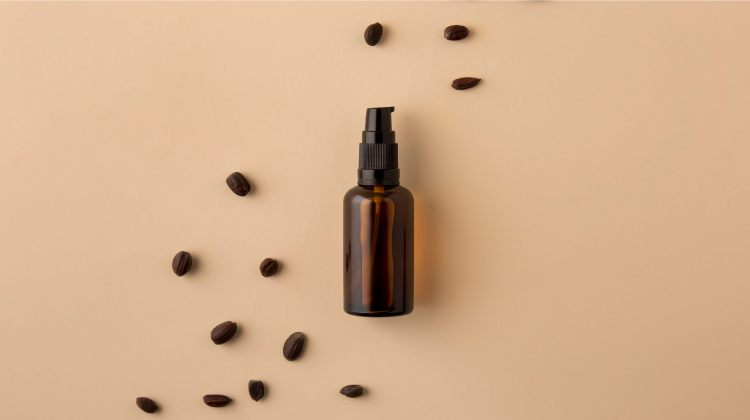
DIY Hair Masks
Seeking to pamper yourself? Create a nourishing hair mask by combining jojoba oil with other hydrating ingredients like avocado, oatmeal, olive oil, and eggs. First, gather the ingredients:
- 1 tablespoon jojoba oil
- 1 ripe avocado, mashed
- 1 tablespoon olive oil
- 2 tablespoons oatmeal (finely ground)
- 1 egg
Then, you can create your own hydrating hair mask by:
- In a bowl, mix everything together until you have a smooth, consistent paste.
- Section your hair and apply the mixture, starting from the roots and working your way down to the tips. Be sure to cover your entire head and give your scalp a gentle massage to stimulate blood flow.
- Once your hair is fully coated with the mask, cover it with a shower cap or plastic wrap.
- Allow the mask to sit for at least 30 minutes to an hour to work its magic then rinse it out thoroughly with lukewarm water.
- Follow up with your regular shampoo and conditioner to remove any residue.
- Once your hair is clean, style it normally.
You should notice your hair feeling softer, more hydrated, and easier to manage. This jojoba oil hair mask DIY is perfect for an at-home spa day.
As a Hot Oil Treatment
Want to treat your hair to some extra TLC? Try a hot oil treatment every two weeks by:
- Heat 3-6 tablespoons of jojoba oil in the microwave for 10 seconds.
- Test the oil's temperature on your wrist before massaging it evenly throughout your hair and scalp.
- Cover your head with a shower cap for up to 20 minutes, then rinse out the oil and follow up with your regular conditioner.
When applying jojoba oil directly to your scalp, use only a small amount (1-2 drops) to avoid clogging pores. You can also mix jojoba essential oil for hair such as rosemary oil for specific hair concerns or with carrier oils like olive oil and coconut oil.
7 Best Jojoba Oils for Hair
Best Overall - Cliganic USDA Organic Jojoba Oil
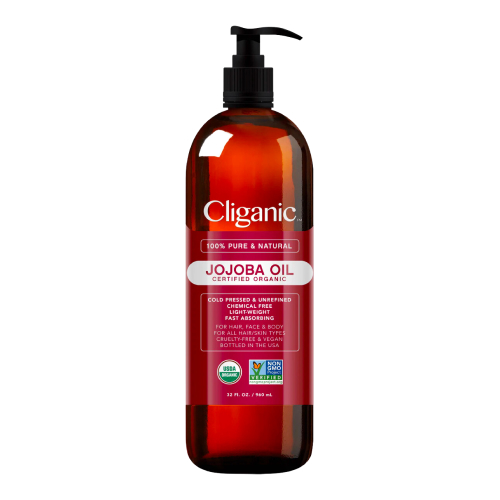 | Pros
|
Cons
|
Among thousands of jojoba oil products, the Cliganic USDA Organic Jojoba Oil truly stands out as the best overall pick. What makes it so special, you ask? Well, this 100% pure and cold-pressed liquid gold (literally, it's golden in color) is packed with nourishing vitamins and minerals, like vitamin E and B-complex(1). These essential nutrients work together to give your hair that much-desired healthy glow.
Sourced from the finest jojoba seeds from the USA, Israel, and Peru, Cliganic Organic Jojoba Oil is unrefined and hexane-free. Its earthy, nutty aroma is mild and pleasant, which adds to the luxurious experience of using this oil.
But wait, there's more! This lightweight, fast-absorbing oil can be used on your face and body too. And don't worry about your hair or skin type—this multitasking wonder is suitable for all. Plus, it's cruelty-free and vegan, so you can pamper yourself guilt-free.
Best Organics - Leven Rose Jojoba Oil
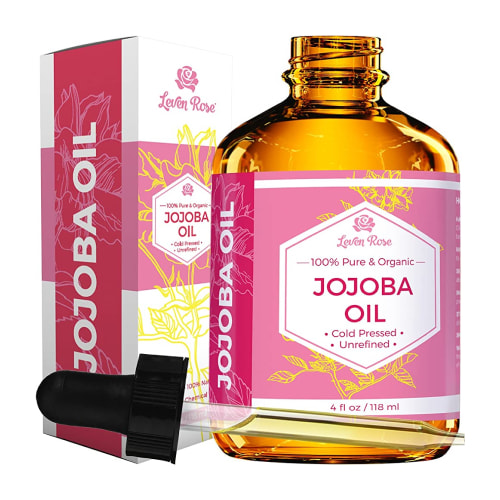 | Pros
|
Cons
|
Leven Rose Jojoba Oil is hands down one of the best organic options out there. Made in the USA, this 100% pure, unrefined, and cold-pressed oil is a fantastic treat for your hair and skin. The fact that it's sourced from Arizona and extracted using an expeller ensures the oil remains nutrient-rich, retaining all those essential fatty acids that we love.
Many people have tried this oil and can testify, it leaves your hair silky smooth and repairs dry, frizzy strands like magic. Plus, it does wonders for your skin, making it feel soft and radiant. Talk about versatility! You can use it to remove makeup, moisturize your face and body, massage, and even treat acne or stretch marks.
Leven Rose is committed to being cruelty-free, so you can feel good about using a product that hasn't been tested on animals.
Best Lightweight - Kate Blanc Jojoba Oil
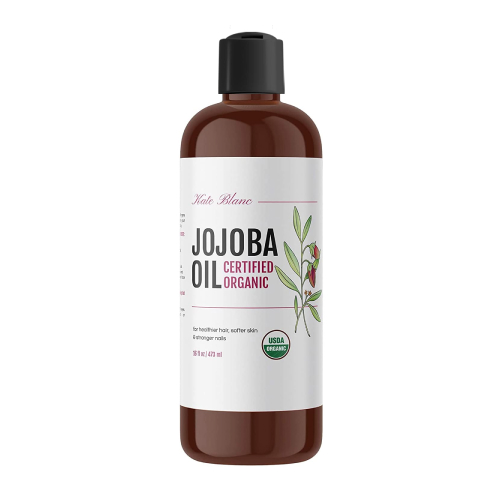 | Pros
|
Cons
|
Kate Blanc Jojoba Oil is considered one of the best lightweight jojoba oil for hair. The lightweight formula is perfect for everyday use, nourishing hair follicles with all the essential nutrients for strong, healthy hair growth.
But that’s not all! Kate Blanc's Jojoba Oil is also a fantastic addition to your shampoo and conditioner, working as a natural anti-hair loss solution. Suffering from dandruff or an itchy scalp? No worries - this oil's antioxidants and vitamin E properties help combat those pesky flakes, too.
And it doesn't stop there - this amazing oil doubles as a moisturizer for your face and skin. It absorbs quickly without clogging pores or leaving a greasy residue. Plus, it's been known to reduce wrinkles and fine lines, making it an excellent anti-aging ally.
Kate Blanc's Organic Jojoba Oil hails from Peru and is cold-pressed, unrefined, and pure. The company is committed to using only organic ingredients and is proudly cruelty-free.
Best Luxury - RMS Beauty Oil
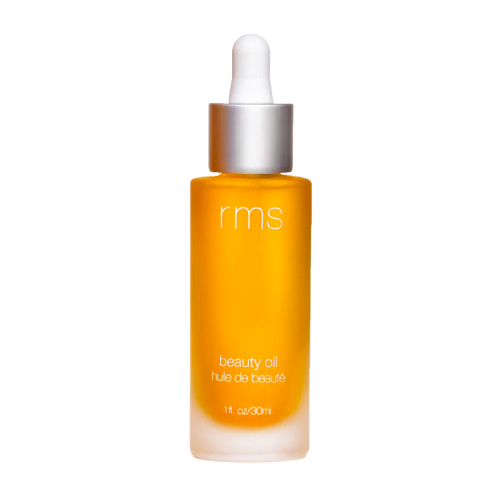 | Pros
|
Cons
|
If you're looking for a touch of luxury in your hair care routine, let me introduce you to RMS Beauty Oil. This powerful blend of lightweight oils is like a dream come true for your skin and hair. Not only does it provide rich, radiant hydration, but it also balances, protects, and improves skin texture, all while being fast-absorbing and silicone-free. Can you believe it?
The star ingredients of this jojoba oil product are organic jojoba, rosehip(6), and wildcrafted buriti oils(7), combined with rare herbal extracts. This magical mix gives your skin antioxidant protection, all-day hydration, and that much-coveted glowing radiance.
To use, simply apply 2-3 drops to clean, damp skin in the morning and/or evening, and gently massage into your face, neck, and chest. You can use it as a nightly treatment or to prep your skin for makeup in the morning.
Best Value - Cliganic Non-GMO Jojoba Oil
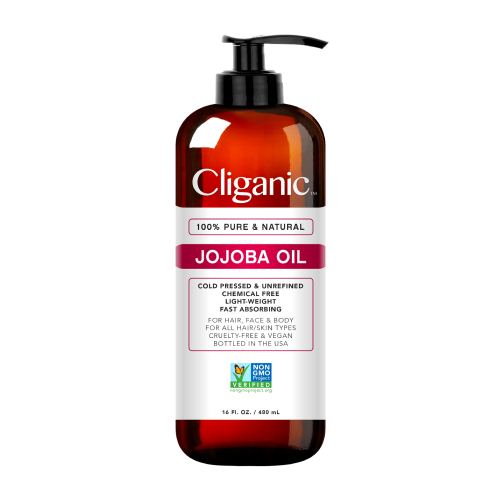 | Pros
|
Cons
|
Craving good jojoba oil but on a budget? You'll love the Cliganic Non-GMO Jojoba Oil. It's the perfect product for anyone with dry skin, dry hair and not a lot of money to burn. It's 100% pure, cold-pressed, unrefined, and all-natural, so you know you're getting the real deal.
The Cliganic Non-GMO Jojoba Oil contains essential vitamins and minerals necessary for healthy-looking skin and hair, such as vitamin E and B-complex, making this product perfect for nourishing and revitalizing dry, damaged hair. This oil from Cliganic has quite a lovely earthy, nutty aroma too! It's not overpowering but still adds a subtle scent to your hair.
This golden jojoba oil is cold-pressed from jojoba seeds, and it's sourced, as usual, from the USA, Israel, and Peru. It's a great value, and a little goes a long way. I recommend using it as a leave-in conditioner, applying a small amount to your hair after showering or whenever you need a boost of moisture. It's also great for styling, taming flyaways, and giving your hair a healthy-looking sheen.
The Cliganic Non-GMO Jojoba Oil is an excellent choice for anyone looking for a high-quality, affordable, and effective hair treatment.
Best Non-Greasy - Art Naturals Jojoba Oil
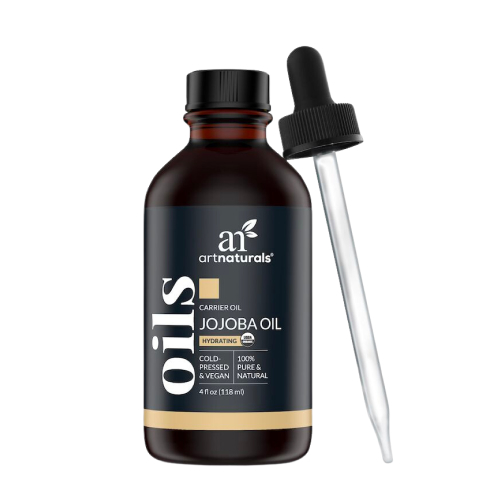 | Pros
|
Cons
|
The Art Naturals Jojoba Oil is an excellent choice for those looking for a deeply moisturizing and non-greasy oil. This oil is packed with Vitamin E and essential minerals, making it a great addition to any beauty DIY project.
What I love about this oil is that it's safe for hair, scalp, and nails, and it can be used as a carrier oil for essential oils. It's gentle enough for every skin type and virtually unscented, making it perfect for diluting essential oils for use in massage and other topical applications.
The conditioning power of Art Naturals Jojoba Oil helps relieve dryness and fights dandruff and psoriasis. You can add a few drops to your favorite shampoo or conditioner for extra hydration, or use it as a leave-in treatment for your hair. The oil is deeply moisturizing but non-greasy, so it won't leave your hair feeling heavy or weighed down.
Best Moisturizing - Pursonic 100% Pure & Natural Golden Jojoba Oil
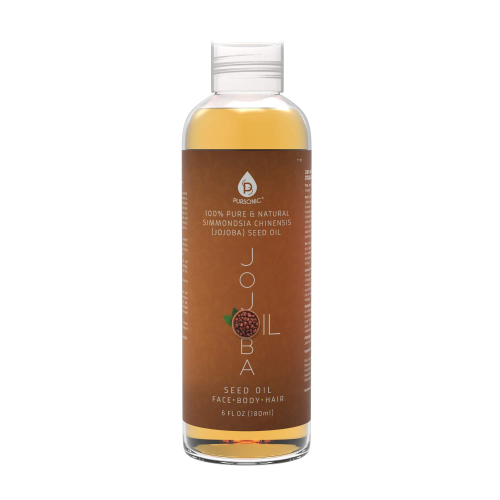 | Pros
|
Cons
|
Last but not least, the Pursonic 100% Pure & Natural Golden Jojoba Oil is easily the best choice for a deeply moisturizing oil full of benefits and can help you achieve a glowing complexion, stronger nails, and healthier-looking hair.
What makes jojoba oil product special is its fatty acid content which provides intense hydration and natural moisture. This also gives our lovely oil the ability to counteract the effects of increased hair fall for men and women, making it an essential addition to your hair care routine.
The benefits of this oil aren't limited to the hair, though. It's also deeply nourishing to nails, can repair damaged collagen matrix, and regulates oil production on acne-prone skin. This pure oil does it all, seemingly.
This oil is made under strict quality standards, and you can use it with confidence. If for any reason you're not satisfied, your purchase is backed by a money-back guarantee.
How to Choose The Best Jojoba Oil Products
It's important to choose the right product to get those luscious locks you've always wanted. So, let's break down what we check for and what you should, too:
Organic and Unrefined
Opt for organic, cold-pressed, and unrefined products to ensure minimal chemical processing and avoid irritation from synthetic preservatives. This way, you'll get the purest form of jojoba oil.
Select oils with organic certifications like Cosmos or AB, guaranteeing that no unauthorized phytosanitary products were used during cultivation. This ensures a more eco-friendly and sustainable option.
Ingredients
Jojoba oil should come from the United States (particularly California or Arizona) or Central America (Mexico), where the plant is native. This guarantees optimal growing conditions for the highest quality oil.
Make sure jojoba oil is the main component and that it contains essential fatty acids like gadoleic, erucic, palmitic, palmitoleic, and oleic acid. Avoid any unnecessary additives that may compromise the oil's benefits.
To get the highest quality and nourishing properties, choose "virgin oil" obtained from the first cold pressing of jojoba seeds. This process retains the most nutrients.
Safe & Precautions
Jojoba oil is generally considered safe for topical use(8) and can work wonders in your hair care routine. However, it's crucial to keep a few precautions in mind to ensure you're using it safely and effectively:
Start Small
When I first started using jojoba oil, I made the mistake of using too much at once. So, take it from me – start with small amounts and follow the recommended doses and directions closely. As you learn how your hair reacts to the oil, you can gradually increase the amount if needed.
Conduct a Patch Test
Have you ever had a bad reaction to a new product? I have, and it's not fun! That's why I always recommend doing a patch test on a small area of your skin before fully incorporating any new oil into your routine. If you experience any irritation, redness, or discomfort, it's best to stop using it immediately.
Keep It Out of Your Mouth and Eyes
I know it sounds obvious, but accidents happen! Jojoba oil shouldn't be ingested, as it contains erucic acid, which can cause serious side effects like heart damage. So, be cautious while applying it to your hair, and avoid getting it in your eyes, which can be irritating.
Consult a Professional
I've got a friend who's always checking with her doctor or dermatologist before using any new product, especially when pregnant or breastfeeding. It's a good habit to have, as they can provide guidance tailored to your specific situation, even though jojoba oil is generally considered safe for topical use.
Alternatives to Jojoba Oil
If jojoba oil isn't quite your cup of tea, there are other natural oils that can offer similar benefits to your hair. Here are the top 5 alternatives to jojoba oil:
Abyssinian Oil
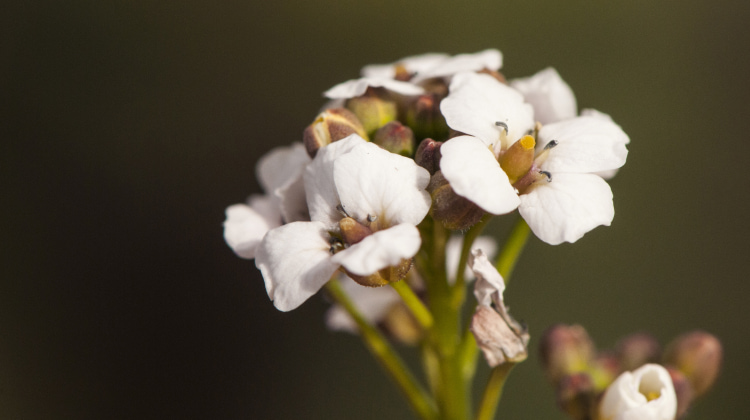
This oil is an excellent substitute for jojoba oil as it has a higher concentration of erucic acid(9), which strengthens and softens hair. Abyssinian oil acts as a natural alternative to silicones and forms a lasting lipid layer over the hair, locking in moisture and detangling dry hair. It even works as a great heat protectant. To use it, simply add Abyssinian oil to your shampoo or conditioner.
Avocado Oil
.jpg)
Rich in vitamins, minerals, and essential fatty acids, avocado oil(10) can nourish and hydrate your hair while promoting growth. It's great for dry or damaged hair and can help to reduce frizz and breakage. Use avocado oil in a similar way to jojoba oil, such as adding it to your conditioner or as a hot oil treatment.
Castor Oil
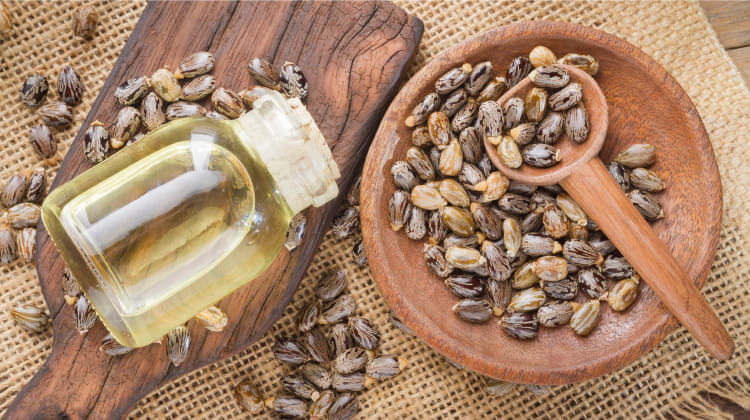
Known for its ability to promote hair growth, castor oil can be an effective alternative to jojoba oil. It contains ricinoleic acid(11), which can help to improve scalp circulation and support hair follicles. To substitute for jojoba oil, massage a small amount of castor oil into your scalp or add it to your hair care products.
Coconut Oil
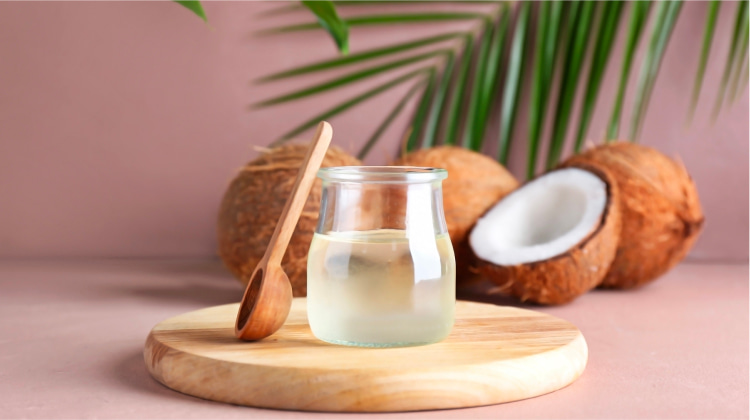
In the debate between jojoba oil and coconut oil(12) for hair, coconut oil is a strong contender. It is known for its moisturizing properties, which makes it great for those with dry or damaged hair. The vitamins and fatty acids in coconut oil help strengthen hair and prevent breakage. However, it may not be suitable for all hair types, as it can weigh down finer hair due to its thicker consistency.
Argan Oil
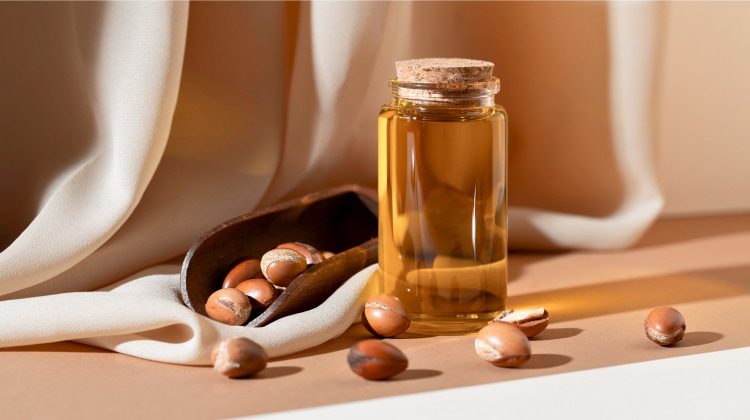
When it comes to comparing jojoba oil and argan oil(13) for hair, argan oil is often praised for its ability to nourish and protect hair. It is rich in antioxidants, vitamin E, and essential fatty acids, making it particularly beneficial for those with dry, damaged, or frizzy hair. Like jojoba oil, argan oil is lightweight and non-greasy, making it suitable for various hair types.
Final Thought: Is Jojoba Oil Good for Hair?
So, as we reach the end of our journey the ultimate question presents itself: "Is jojoba oil good for hair?" The answer is obvious: a resounding yes! Jojoba oil boasts numerous benefits that cater to various hair types and concerns. From moisturizing and sealing in hydration to protecting your hair from heat damage, this oil does it all.
You know what I love about jojoba oil? It's versatile and suitable for almost everyone. Whether you have straight, curly, thick, or thin hair, jojoba oil can be a game-changer. Just remember to adjust the amount you use based on your hair type, and you're golden.
But hey, if you're still on the fence about jojoba oil or find that it's not the perfect match for your hair, don't fret. There are many other fantastic oils to try, it's all about finding what works best for you! In conclusion, give jojoba oil a chance, and you might just find your hair's new best friend.
Frequently Asked Questions
Can you put jojoba oil in your hair?
Yes, you can put jojoba oil in your hair. It helps moisturize, protect, and strengthen hair while sealing in hydration and improving hair health.
Does jojoba oil grow hair?
Jojoba oil can support hair growth by maintaining a healthy scalp, reducing inflammation, and nourishing hair follicles.
Does jojoba oil thicken hair?
Jojoba oil doesn't thicken hair directly, but it can improve overall hair health, potentially leading to thicker, stronger strands.
Does jojoba oil moisturize hair?
Yes, jojoba oil moisturizes hair by locking in hydration and preventing moisture loss.
Is jojoba oil good for hair loss?
Jojoba oil can be beneficial for hair loss. The benefits of jojoba oil for hair loss lie in promoting scalp health, reducing inflammation, and nourishing hair follicles.
Can jojoba oil cause hair loss?
Jojoba oil doesn't usually cause hair loss. However, using excessive amounts or not rinsing it properly could lead to clogged pores and hair issues.
Can I use jojoba oil on my hair everyday?
Yes, you can use jojoba oil on your hair daily, but ensure you apply only a small amount to avoid weighing hair down or causing buildup.
Is coconut oil or jojoba oil better for hair?
Both oils are beneficial for hair, but jojoba oil is lighter and more suitable for all hair types. Coconut oil is heavier and works better for those with thicker or drier hair.
Is jojoba oil good for natural hair?
Yes, jojoba oil is good for natural hair as it helps lock in moisture, reduce frizz, and protect the hair shaft.
How much jojoba oil to use on hair?
The amount of jojoba oil to use on hair depends on hair type and specific needs. Start with a few drops and adjust as needed for your hair's texture and density.
References
1. Gad, H.A., Roberts, A., Hamzi, S.H., Gad, H.A., Touiss, I., Altyar, A.E., Kensara, O.A. and Ashour, M.L. (2021). Jojoba Oil: An Updated Comprehensive Review on Chemistry, Pharmaceutical Uses, and Toxicity. Polymers, {online} 13(11), p.1711. doi:https://doi.org/10.3390/polym13111711.
2. Pazyar N;Yaghoobi R;Ghassemi MR;Kazerouni A;Rafeie E;Jamshydian N (2013). Jojoba in dermatology: a succinct review. Giornale italiano di dermatologia e venereologia : organo ufficiale, Societa italiana di dermatologia e sifilografia, {online} 148(6). Available at: https://pubmed.ncbi.nlm.nih.gov/24442052/.
3. Hosking, A.-M., Juhasz, M. and Atanaskova Mesinkovska, N. (2018). Complementary and Alternative Treatments for Alopecia: A Comprehensive Review. Skin Appendage Disorders, {online} 5(2), pp.72–89. doi:https://doi.org/10.1159/000492035.
4. Al-Obaidi, J.R., Mohammed Farouq Halabi, Nasser Alkhalifah and Attia, M.F. (2017). A review on plant importance, biotechnological aspects, and cultivation challenges of jojoba plant. {online} ResearchGate. Available at: https://www.researchgate.net/publication/319272463_A_review_on_plant_importance_biotechnological_aspects_and_cultivation_challenges_of_jojoba_plant.
5. Dongare, P. N., Bakal, R. L., Ajmire, P. V., Patinge, P. A., More, M. P., and Manwar, J. V. (2021). An Overview on herbal cosmetics and cosmoceuticals. Int J Pharm Sci Rev Res, 68(1), 75-78. Available at: https://globalresearchonline.net/journalcontents/v68-1/13.pdf.
6. Gao, X., Björk, L., Trajkovski, V. and Uggla, M. (2000). Evaluation of antioxidant activities of rosehip ethanol extracts in different test systems. Journal of the Science of Food and Agriculture, {online} 80(14), pp.2021–2027. doi:https://doi.org/10.1002/1097-0010(200011)80:14%3C2021::aid-jsfa745%3E3.0.co;2-2.
7. Pereira, G.S., Freitas, P.M., Basso, S.L., Araújo, P.M. de, Santos, R.R. dos, Junior, R. da S.A., Conde, C.F., Pereira, E.F.D., Haverroth, M. and Amaral, A.C.F. (2018). Quality Control of the Buriti oil (Mauritia flexuosa L. f.) for Use in 3-Phase Oil Formulation for Skin Hydration. International Journal of Phytocosmetics and Natural Ingredients, {online} 5(1), pp.1–1. doi:https://doi.org/10.15171/ijpni.2018.01.
8. Journal of the American College of Toxicology. (2016). 5 Final Report on the Safety Assessment of Jojoba Oil and Jojoba Wax, 1992. {online} Available at: https://journals.sagepub.com/doi/abs/10.3109/10915819209141992.
9. Iłowska, J., Chrobak, J., Grabowski, R., Szmatoła, M., Woch, J., Szwach, I., Drabik, J., Trzos, M., Kozdrach, R. and Wrona, M. (2018). Designing Lubricating Properties of Vegetable Base Oils. Molecules, {online} 23(8), p.2025. doi:https://doi.org/10.3390/molecules23082025.
10. Flores, M., Saravia, C., Vergara, C., Avila, F., Valdés, H. and Ortiz-Viedma, J. (2019). Avocado Oil: Characteristics, Properties, and Applications. Molecules, {online} 24(11), p.2172. doi:https://doi.org/10.3390/molecules24112172.
11. Nitbani, F.O., Tjitda, P.J.P., Wogo, H.E. and Detha, A.I.R. (2022). Preparation of Ricinoleic Acid from Castor Oil:A Review. Journal of Oleo Science, {online} 71(6), pp.781–793. doi:https://doi.org/10.5650/jos.ess21226.
12. Withana‐Gamage, T.S., Perera, S.P. and Wanasundara, U.N. (2020). Coconut Oil. Bailey’s Industrial Oil and Fat Products, {online} pp.1–37. doi:https://doi.org/10.1002/047167849x.bio054.pub2.
13. Guillaume, D., and Charrouf, Z. (2011). Argan oil. Alternative Medicine Review, 16(3), 275-276. Available at: https://altmedrev.com/wp-content/uploads/2019/02/v16-3-275.pdf.

.jpg)
.jpg)
.jpg)
.jpg)
.jpg)
.jpg)
.jpg)
.jpg)
.jpg)
.jpg)